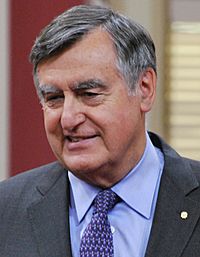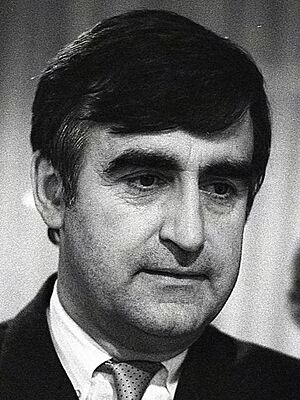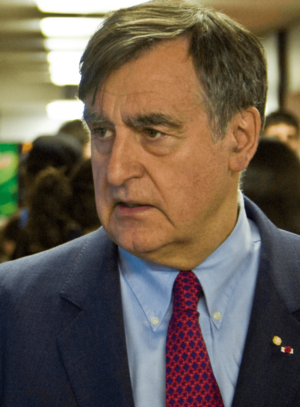Lucien Bouchard facts for kids
Quick facts for kids
Lucien Bouchard
|
|||||||||||||||||||||||||||||||||||
|---|---|---|---|---|---|---|---|---|---|---|---|---|---|---|---|---|---|---|---|---|---|---|---|---|---|---|---|---|---|---|---|---|---|---|---|

Bouchard in 2013
|
|||||||||||||||||||||||||||||||||||
| 27th Premier of Quebec | |||||||||||||||||||||||||||||||||||
| In office January 29, 1996 – March 8, 2001 |
|||||||||||||||||||||||||||||||||||
| Monarch | Elizabeth II | ||||||||||||||||||||||||||||||||||
| Lieutenant Governor | Martial Asselin Jean-Louis Roux Lise Thibault |
||||||||||||||||||||||||||||||||||
| Deputy | Bernard Landry | ||||||||||||||||||||||||||||||||||
| Preceded by | Jacques Parizeau | ||||||||||||||||||||||||||||||||||
| Succeeded by | Bernard Landry | ||||||||||||||||||||||||||||||||||
| President of the Parti Québécois | |||||||||||||||||||||||||||||||||||
| In office January 27, 1996 – March 2, 2001 |
|||||||||||||||||||||||||||||||||||
| Preceded by | Jacques Parizeau | ||||||||||||||||||||||||||||||||||
| Succeeded by | Bernard Landry | ||||||||||||||||||||||||||||||||||
| Leader of the Opposition | |||||||||||||||||||||||||||||||||||
| In office November 4, 1993 – January 14, 1996 |
|||||||||||||||||||||||||||||||||||
| Preceded by | Jean Chrétien | ||||||||||||||||||||||||||||||||||
| Succeeded by | Gilles Duceppe | ||||||||||||||||||||||||||||||||||
| Leader of the Bloc Québécois | |||||||||||||||||||||||||||||||||||
| In office July 25, 1990 – January 16, 1996 |
|||||||||||||||||||||||||||||||||||
| Preceded by | Position established | ||||||||||||||||||||||||||||||||||
| Succeeded by | Gilles Duceppe (interim) | ||||||||||||||||||||||||||||||||||
|
|||||||||||||||||||||||||||||||||||
|
|||||||||||||||||||||||||||||||||||
| Personal details | |||||||||||||||||||||||||||||||||||
| Born | December 22, 1938 Saint-Cœur-de-Marie, Quebec, Canada |
||||||||||||||||||||||||||||||||||
| Political party | Parti Québécois (provincial, 1990–2010) Bloc Québécois (federal, 1990–2010) |
||||||||||||||||||||||||||||||||||
| Other political affiliations |
Progressive Conservative (federal, c. 1984–1990) | ||||||||||||||||||||||||||||||||||
| Spouse | Solange Dugas (since May 18, 2013) | ||||||||||||||||||||||||||||||||||
| Children | 2 | ||||||||||||||||||||||||||||||||||
| Alma mater | Université Laval | ||||||||||||||||||||||||||||||||||
| Profession | Lawyer | ||||||||||||||||||||||||||||||||||
Lucien Bouchard (born December 22, 1938) is a Canadian lawyer and former politician. He played a big role in Quebec and Canadian politics. He was a minister in the Canadian government and later became the Premier of Quebec.
Bouchard founded and led the Bloc Québécois, a political party focused on Quebec's independence. He was the Leader of the Opposition in Canada from 1993 to 1996. He was also a key figure in the "Yes" campaign during the 1995 Quebec referendum on independence. After the referendum, he became the 27th premier of Quebec, serving from 1996 to 2001.
Lucien Bouchard: A Political Journey
Early Life and Career
Lucien Bouchard was born in Saint-Cœur-de-Marie, Québec, on December 22, 1938. His parents were Alice Simard and Philippe Bouchard. His brother, Gérard Bouchard, is a well-known historian.
Lucien Bouchard finished college in 1959. He then studied social science and law at Université Laval, graduating in 1964. He became a lawyer that same year.
He worked as a lawyer in Chicoutimi until 1985. During these years, he also held several public service roles. He was involved in committees and commissions that looked into labor and industry issues. He also helped the Quebec government with talks between unions and the public sector.
Stepping into Politics
Lucien Bouchard's political journey was quite interesting. He joined different political parties over the years. He even started his own party, the Bloc Québécois.
Bouchard has always been a Quebec nationalist. This means he believed Quebec should have more control over its own future. He supported the "Yes" side in the 1980 Quebec referendum on sovereignty.
In 1984, Brian Mulroney, a close friend from law school, became the Prime Minister of Canada. Mulroney asked Bouchard to take on important roles. In 1985, Bouchard became the Canadian ambassador to France.
Joining the Mulroney Government
In 1988, Bouchard came back to Canada. He became a Progressive Conservative Member of Parliament (MP). He was elected from a region near the Saguenay River.
He was quickly made a minister in Mulroney's government. He served as Secretary of State and later as Minister of the Environment.
Bouchard believed that the Meech Lake Accord would keep Quebec as part of Canada. This accord was a plan to change Canada's constitution. However, when changes were suggested to the accord, Bouchard disagreed. He felt these changes weakened the original plan. Mulroney did not agree with his reasons.
Forming the Bloc Québécois
Soon after, Bouchard announced his support for Quebec's independence. He sent a message to the Parti Québécois (PQ), a party that wanted Quebec to be a separate country.
When Prime Minister Mulroney found out, he removed Bouchard from his cabinet. Bouchard later said he resigned because he couldn't support the changes to the Meech Lake Accord. It was later revealed that Bouchard had made a deal with PQ leader Jacques Parizeau. This deal involved Bouchard supporting Quebec's independence.
Mulroney was very upset when he learned about this deal years later. He felt betrayed that Bouchard had made this agreement while still a minister in his government.
Bouchard left the Progressive Conservatives. After the Meech Lake Accord failed, he formed a new party called the Bloc Québécois. Five former Conservative MPs and two former Liberal MPs joined him. This new party supported Quebec's independence.
In the 1993 Canadian federal election, the Bloc Québécois won 54 out of 75 seats in Quebec. This was enough to make them the second-largest party in the Canadian Parliament. Because of this, Bouchard became the first leader of a separatist party to be the Leader of the Opposition in Canada.
Leading the Opposition
After the election, Bouchard realized that many of his party members were not fluent in English. So, he announced that Bloc MPs would only speak French in Parliament. This policy is still in place today.
As Leader of the Opposition, Bouchard often raised issues about Canadian unity. In 1994, while serving in this role, Bouchard lost his left leg due to a serious infection.
The 1995 Quebec Referendum
In 1995, Bouchard, as leader of the Bloc Québécois, signed an agreement with Parti Québécois leader Jacques Parizeau and Action démocratique leader Mario Dumont. This agreement set out the plan for a 1995 Quebec referendum on independence.
Bouchard played a key role in convincing Parizeau to include a plan for an association with Canada in the referendum question. He campaigned for the "Oui" (Yes) side. Jacques Parizeau first led the "Oui" campaign. But as support for independence slowed, Bouchard took over the official leadership.
The referendum was very close. The "No" side won by a small margin: 50.58% to 49.42%.
Before the referendum, Bouchard made some controversial comments. In one instance, he made a statement that caused a lot of anger. Later, during a TV speech, he held up a newspaper with a photo of Prime Minister Jean Chrétien and Pierre Trudeau laughing. Bouchard claimed they were laughing at Quebec. Chrétien later called this a very unfair political trick.
Becoming Premier of Quebec
After the "Yes" side lost the 1995 referendum, Jacques Parizeau resigned as Quebec premier. Lucien Bouchard was chosen as the new leader of the Parti Québécois in January 1996. He became the premier of Quebec shortly after.
While in office, Bouchard said that there would be no new referendum on independence for a while. He later confirmed that he had no plans for a referendum when he became Premier.
One of the main goals of Bouchard's government was to improve Quebec's economy. He wanted to achieve a "zero deficit," meaning the government would not spend more money than it took in. Previous governments had left a large debt in the province's budget.
Bouchard led the Parti Québécois in the 1998 Quebec general election. He ran against Jean Charest, who was now the leader of the provincial Liberal Party. Even though the Liberals won slightly more votes overall, the Parti Québécois won more seats. This allowed Bouchard's party to stay in power for another term.
As Premier, Bouchard balanced the budget. He also expanded social programs, like creating a universal childcare system and a system for prescription medications (pharmacare).
During his time as Premier, Bouchard refused to give money to the Montreal Expos baseball team for a new stadium. He felt he could not approve funding for a sports facility when the province was closing hospitals.
Life After Politics
Lucien Bouchard left politics in 2001. Bernard Landry took over as Quebec premier. Bouchard said that he left because he couldn't restart the push for Quebec's independence. Others believe a controversy involving a Parti Québécois candidate, known as the Michaud Affair, also played a role in his decision.
After retiring, he returned to working as a lawyer. He became a partner at a law firm, focusing on business law. He also serves on the boards of several companies and organizations, like the Montreal Symphony Orchestra.
In 2010, Bouchard started speaking publicly about politics again. He said that Quebec's independence was no longer a realistic goal. He still considered himself a supporter of independence, but he felt it didn't offer solutions for Quebec's current problems. He also criticized the Parti Québécois for focusing too much on independence.
In a 2014 documentary, Bouchard explained that the Bloc Québécois was only meant to exist for a short time. Its purpose was to prepare for the 1995 referendum. He believed its long existence weakened Quebec's influence in Canada. He also thought the 1995 referendum might have passed if it had been a two-step process. This would have involved a first vote to allow negotiations for sovereignty, and a second vote to approve the results. He blamed Parizeau for not taking this approach.
Personal Life
Lucien Bouchard married his first wife, Jocelyne Côte, in 1966. After their divorce, he married Audrey Best. Audrey was from France and grew up in California. She worked as a flight attendant and later became a lawyer. She passed away in 2011 at age 50 from breast cancer.
On May 18, 2013, Bouchard married his third wife, Solange Dugas.
Bouchard has two sons, Alexandre and Simon. In 1994, while he was the Leader of the Opposition, he lost his left leg due to a serious bacterial infection.
Views on Quebec's Future
In 2005, Bouchard and other Quebecers published a paper called "Pour un Québec lucide" (For a clear-eyed vision of Quebec). This paper warned about the challenges Quebec would face in the future, especially with its aging population.
In 2006, Bouchard stated that the people of Quebec needed to work more. He said that his generation had created most of the province's debt. He believed future generations should not have to pay for it.
Bouchard's Legacy
Bouchard's government made some important changes. These included cuts to health care spending to balance the budget. His government also created a low-cost, universal public daycare system and a universal system for prescription medications. He is also remembered for creating Emploi Québec, a program to help with employment.
People remember Bouchard for his strong personality and his high expectations for those he worked with. He was also known for his charm and good speaking skills. Bouchard has said that he will not return to politics.
Honours and Awards
Lucien Bouchard has received many awards and honours throughout his life:
- He became a member of the Queen's Privy Council for Canada in 1988.
- He received the 125th Anniversary of the Confederation of Canada Medal in 1992.
- He received honorary law degrees (Doctorate Honoris causa) from several universities:
- Lumière University Lyon 2 in 2000.
- Université de Montréal in 2006.
- Université du Québec à Chicoutimi (UQAC) in 2007.
- He received the Queen Elizabeth II Golden Jubilee Medal in 2002.
- He was made a Commander of the Legion of Honour in 2002.
- He became a Grand Commander of the National Order of Quebec in 2008.
- He received the Queen Elizabeth II Diamond Jubilee Medal in 2012.
See also
 In Spanish: Lucien Bouchard para niños
In Spanish: Lucien Bouchard para niños
- List of Quebec premiers
- Quebec sovereignty movement
- History of Quebec
- Politics of Quebec
- Politics of Canada
 | Selma Burke |
 | Pauline Powell Burns |
 | Frederick J. Brown |
 | Robert Blackburn |



